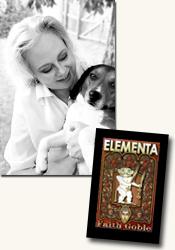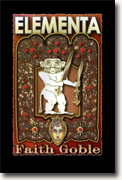author interview
book reviews:
· general fiction
· chick lit/romance
· sci-fi/fantasy
· graphic novels
· nonfiction
· audio books
· author interviews
· children's books @
curledupkids.com
· DVD reviews @
curledupdvd.com
newsletter
win books
buy online
links
home
for authors
& publishiss
for reviewers
The maga Portunista and her colorful subcommanders lead a ragged, outnumbered brigade in the wake of an international war, against her increasingly ruthless adversaries. But the ambitious commander finds herself irreconcilably drawn to a charismatic, kind and hopeful stranger. Click his e for more on Cry of Justice or read our review.
|
|||||
 
Luan Gaines interviewed author Faith Goble about her poetry collection Elementa Interviewer Luan Gaines: Why did you become a poet? How long have you been writing poetry? Faith Goble: I started writing seriously when I was in my late teens as a way to deal with some difficult and painful experiences—writing poetry is a shortcut to the heart, I think. It's a quick, sometimes down-and-dirty way to get to what really matters and try to deal with it. Then I only wrote a few poems during the next two decades, but I started writing more about seven years ago. I've really only been writing regularly for about the past year, and I still find that composing poetry is effective therapy, even when I'm writing about something as impersonal as the weather (although here in Kentucky, the weather can feel pretty personal). What particular poets or writers have inspired your creativity? Frost definitely is first on my list; I love his work. Shakespeare, Marvell, Dickinson, Hardy, and Wallace Stephens are some of my other favorite poets; and as for novelists, I particularly admire Tolstoy, Jane Austin, Cervantes, and Nabokov. You describe poetry as “the instrument by which our experiences are reshaped and reborn.” Please elaborate on this thought. All of my poems are the products of my own experiences and observations. For me, and I suspect for many others, writing is a way to take the raw and sometimes painful material of our thoughts, feelings, and experiences, pass it though the body of our knowledge and the anatomy of our emotions and remake it in the image of our deepest selves—and like any child, a poem has a mind of its own. You say that “poems are alive to me: They have often kept me awake at night attending to their importunities or playing with them until we both fell asleep.” Given this description, what is your process when writing? Often a phrase or an idea comes to me before I get out of bed, and I think about the words as I go about my work during the day. I always end up carrying the poems to bed with me and working out their problems or just playing with the words until I'm pleased with the results. When I'm in the middle of a poem, I get up with it and lie down with it just as I did with each of my children when they were babies.
Whenever I'm writing, I'm trying to provoke an emotional response of some kind; what kind depends on the poem. I don't think that poetry—either the reading or writing of it—should be a purely intellectual exercise. And even when I'm not trying to evoke strong emotions, I want to try create a scene, an image, a time; to induce a feeling, make someone laugh or cry, or even get a “yeah, that's it—I know what you're talking about” or a “I never thought of that before,” from the reader. Of course, some of my poems are written mainly for the sound of the verses, the music I hear in them. Some of my favorite selections in Elementa Rhyme is a powerful poetic instrument, and because of its energy it's easy to allow it to dominate the other elements of a poem. I use ambiguity carefully in my work—the potential of implicit meaning and double entendre has always fascinated me, so I'm careful to avoid sacrificing meaning for the convenience of rhyme scheme. But rhyme seems to suit me more as I grow older; I'm not sure why. Perhaps it's because age has made me more interested in tempering harsh experience with the beauty or playfulness of rhyme. I don't think I take myself quite so seriously now. “Elementa” is your title poem. How does this poem define the collection? I write about the feelings, situations, and memories which have made me who I am—my elementals, as it were. And I sometimes write about the earth itself, the elemental mother of us all. How much does your everyday environment inform your work? Do you find inspiration in simple things or the greater themes that define our lives? I often write about the weather, the seasons, the landscape, or mundane events and niggling irritations, so I'd have to say that my everyday life greatly informs my work. Still, many of my poems, including many of the ones which deal on one level with the physical world, have a subtext (for example, “A Spell of Winter” has several meanings); they're concerned with some of the major questions of life: how we deal with frustration, with loss, with growing old, with sorrow and despair. Poet Beth Ann Fennelly (Tender Hooks) says, “If I could think of anything I wouldn’t put in a poem, I’d put it immediately, rather perversely, in a poem. Because poetry is play, is a game, though a serious one.” Is there anything, any emotion, idea or experience you won’t write about? I don't consider any subjects off-limits, but there are some things I don't think I could write about directly, simply because it would be too painful And I don't think I could bear to use some sorrows in my work; they would be sacred, I suppose you could say. Thankfully, I haven't experienced many misfortunes of that nature. How important is humor in writing poetry? Passion? Honesty? Humor helps keeps (more of) us from killing one another. It's also what keeps my own work from becoming overly vitriolic. Many of my poems are truly caustic, and without a robust spirit of humor, they would lose their appeal and be too bitter to swallow. And in all of its manifestations, passion is always important, even if it's just an ardent love of the language. Of course, honesty is a must too—I think many readers have built-in BS detectors; they can sense falsity immediately. Honesty is essential if a poem is to ring true. Other than the title poem, do you have a favorite selection in Elementa I think my favorite is “The Kudzu Is a Lunatic Vine.” It's a poem that almost wrote itself—it sang itself to me. Do your write in any other form besides poetry? I've written articles and op-ed pieces for newspapers, including the Courier Journal, and I've also written commentaries that have aired on NPR member stations. I'm also slowly working on an unfinished (and probably never-to-be finished) novel.
I've found there are few publishers interested in rhythmic or rhyming poetry (or anything that isn't terribly academic). I think the current emphasis on extremely modern styles of poetry is a bit off-putting for many who might otherwise enjoy reading poems and has alienated the buying public to some extent. Still, I don't think many poets, regardless of style, have ever believed that they were going to be able to pay the mortgage writing poems—money isn't really a motivator for most poets; it certainly isn't for me. Of course, I'd love to be able to pay all my bills with my writing, but that's a pipe dream. Most of us have other jobs (for example, I have a small graphic arts business, and I've known some very fine writers who were teachers, bartenders, and lawyers).
How much does your emotional environment contribute to your work? Is quiet essential, or a certain writing environment? I can't write if I'm terribly worried and distracted by a crisis of some sort or if I'm feeling too depressed. And solitude is sometimes essential, even if it's the solitude that comes as I'm doing chores, such as working in my yard. As for quiet, I live with three spoiled dogs and two of my children, and having raised and home schooled three kids and cared for a houseful of pets, quiet is something I gave up on many years ago. I work whenever I have a free minute and a bit of inspiration, occasionally yelling death threats at my loud-mouthed dogs as I type. How do the passages of life feed your inspiration for new work? Have you created more significant poetry in the fullness of time? In that sense, is youth an obstacle? Changes are fantastic grist for the mill—aging, divorce, loss of illusions, losses of all kinds—these are the stuff of poetry! And I've become more knowledgeable and philosophical as I've grown older; but at the same time, I've gotten blunter, less tolerant of hypocrisy, and less likely to pull my punches. I think my own work has gotten more honest and real, more multi-layered as I've aged. Of course, one reason that my work has improved is simply is that I've developed more patience and dedication as time passed.
Do you have more work in progress? Always. I'm also working on helping edit the inaugural edition of GPR, which is taking a significant amount of time. What advice do you have for aspiring poets? I think it was Updike who said that there are writers and there are readers—I don't know that I agree with that; I believe that reading is important. I'd also suggest that aspiring poets spend as much time observing nature as they can, away from busyness and bustle of the world; spend time alone and quietly if possible—and always keep a thesaurus handy! Do you have any advice for aspiring writers? Learn your craft, and write your heart out. Remember, always, that you have to connect to a reader on an emotional level, or you’ve done nothing but write for yourself. Born and raised in the mountains of eastern Kentucky, Faith Goble is an award-winning artist and a writer whose work has appeared in newspapers and on public radio. She has three grown children, three overgrown dogs, and one cat that's grown too big for his britches.. Luan Gaines is a contributing editor of curledup.com. Her interview with Faith Goble was written in conjunction with her review of Elementa. © Luan Gaines/2008.
|
|||||
| fiction · sf/f · comic books · nonfiction · audio newsletter · free book contest · buy books online review index · links · · authors & publishiss reviewers |
|
| site by ELBO Computing Resources, Inc. | |


